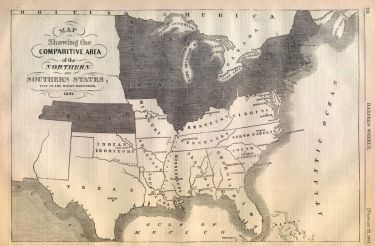 White Baptist commitment to the Confederacy is similar to that of the South’s other Christian denominations: many if not most embrace (in some fashion or another) the Confederacy as God’s Kingdom on earth, while few publicly disagree with the belief that African slavery is God’s will for the black race. Calvinism, a long-held Christian belief system positing God’s complete sovereignty over history and humankind, is the theology that buttresses the divine status of the racially-driven Confederacy and God’s curse of slavery upon Africans. While Presbyterians fully embody Calvinism, even many white Southern Methodists, not proponents of Calvinism proper, find themselves projecting a sense of Providence upon the Confederacy.
White Baptist commitment to the Confederacy is similar to that of the South’s other Christian denominations: many if not most embrace (in some fashion or another) the Confederacy as God’s Kingdom on earth, while few publicly disagree with the belief that African slavery is God’s will for the black race. Calvinism, a long-held Christian belief system positing God’s complete sovereignty over history and humankind, is the theology that buttresses the divine status of the racially-driven Confederacy and God’s curse of slavery upon Africans. While Presbyterians fully embody Calvinism, even many white Southern Methodists, not proponents of Calvinism proper, find themselves projecting a sense of Providence upon the Confederacy.
Many Baptists, historically a theologically diverse grouping of Christians, are Calvinists at this time. Calvinistic theology is at its historical pinnacle among white Southern Baptists, whose lone seminary was founded by Presbyterian-trained theologians. During the war years, many white Southern Baptists find much in common with white Southern Presbyterians, theologically-speaking. Both groups widely believe that the Confederacy is God’s chosen nation, and therefore the South will prevail because of God’s providential will. Temporary setbacks, such as Union Army victories in Virginia and Tennessee, can not ultimately thwart God’s will.
Against this shared theological backdrop Southern Baptist newspapers periodically reprint articles from the Presbyterians’ leading newspaper, the Christian Observer (based in Richmond), that reflect both denominations’ Christian Confederate nationalist convictions. Today’s North Carolina Biblical Recorder publishes one such article from the Christian Observer, which itself reprints a portion of an article from the Southern Christian Advocate, South Carolina’s Methodist newspaper.
This is not the hour for desponding but for earnest, unceasing prayer, and united and undaunted effort in defence of our homes and rights dearer than life. The fall of New Orleans and the threatened attacks upon our city, should dishearten no one, and create no panic among our citizens. It is time to look to God for succor, and not to distrust his Providence, or Grace. The call to prayer by the President meets, we trust, a cordial response in the hearts of many thousands who daily bow before God and, in submission to His will, fervently implore his protection and blessing in behalf of our country and our armies. These prayers must be accompanied with the most determined effort, skillfully directed, to conquer a peace. The united forces of the South have not yet entered the field. Let every man haste to the rescue, and the deadly conflict will not be long continued. We add in the words of the “Southern Christian Advocate,” that
“We cannot afford to fail. To lose our cause is to lose everything except our souls, and to many this loss also would be imminent. It would be to lose all on earth we hold dear. To say nothing of the ignominy of subjugation, a thought that no high-minded man can endure, every selfish as well as every patriotic instinct revolts at the thought of failure. The patriot loses his cherished country and its independence, the Christian freedom to worship God, as his conscience dictates–the father the hopes he has entertained for his children–the man of wealth his possessions–the government funds become worthless–the banks fail–the wealth of the land is absorbed by our enemies to pay the price of our subjugation, and we all together become miserable slaves and paupers–crushed under the label of a brutal and tyrannical mob.”
The article, in short, summarizes common sentiments shared by many white Baptists, Presbyterians and Methodists of the Confederacy. “The call to prayer by the President” referenced in the article is a day of fasting and prayer set aside by Confederate President Jefferson Davis for May 16, two days hence. While not evident in this instance, many Baptist, Presbyterian and Methodist leaders sometimes seemingly demand that their respective denominations’ churches obey such government-driven religious services during the war.
In addition, the Southern white disconnect over the issue of slavery is apparent herein. While Southern whites insist that slavery is God’s good and revealed will for Africans, the thought of slavery being forced upon whites (a baseless charge against the North that is repeated ad nauseam by many white Southerners throughout the war) is absolutely abhorrent.
Source: “Prayer for Our Country,” Biblical Recorder, May 14, 1862 (link)


